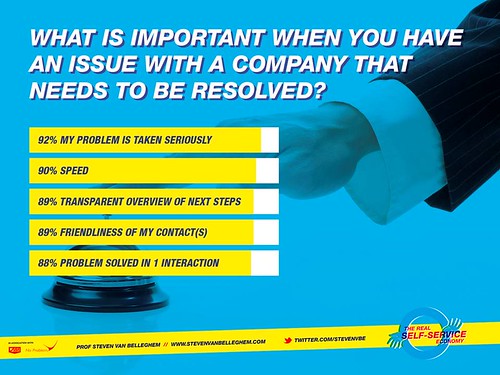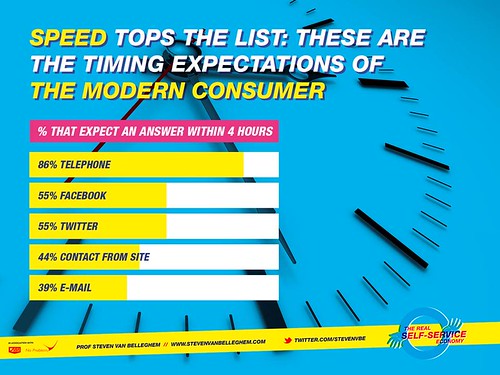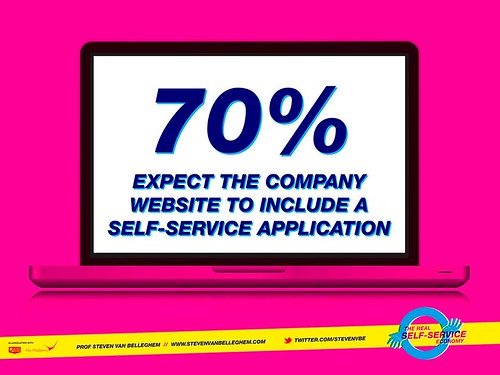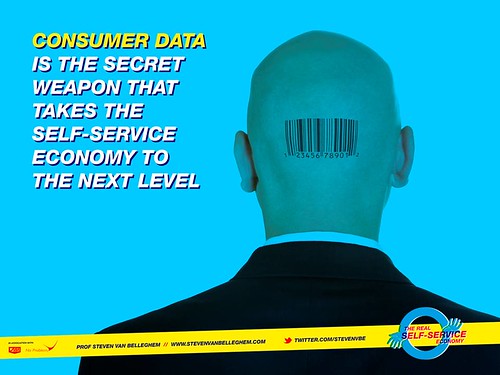Welcome to the real self-service economy
Consumers want to be in control. They show a clear preference for self-service solutions, both in planning a purchase, the purchase itself and possible questions afterwards. Smart companies try to anticipate this trend because it is in the mutual interest of businesses and their customers.
The use of customer data is absolutely indispensable as this will improve the customer experience in every phase of the purchase process. Tweet This
This evolution doesn’t mean the end of the traditional 'human' customer service. The need for a safety net with personal contact still exists. This contact can be organized by the companies themselves, but it may also mean contact with other customers.
These are some of the conclusions from a worldwide study conducted over the past few months in collaboration with SSI (fieldwork) and No Problem! (translation partner). The study included ten countries from all around the world.
The results of the study are detailed in this presentation and, as usual, my report can be downloaded and used free of charge.
Welcome to the 'real' self-service economy
Fifteen years ago, companies forced consumers to perform certain task themselves. When banks started charging customers for not executing their own transfers this led to widespread protest. Today the world looks very different: a company that doesn’t offer a self-service solution has to suffer the consequences.
Consumers expect companies to keep improving their level of service. They want their questions answered and problems solved in a timely, friendly and efficient manner. Consumers have a strong aversion to having to contact a company several times or sharing the same information more than once.

The days are long gone when it was OK to answer an e-mail inside 24 hours. 39% of modern consumers expect a reply within 4 hours. Twitter and Facebook users have even less patience. 55% of social media users want an answer in less than 4 hours.

Self-service is the only long-term solution to meeting customer expectations. Already, 70% of consumers expect a self-service option for handling commercial questions and complaints. Still, this doesn’t preclude the need for a personal solution: if self-service falls short, personal contact as a safety net is an absolute necessity.

Data is the secret weapon of the self-service economy
Big data is one of the buzz words of the last few years. In the years to come, three key questions will determine the use of data:
- ‘How far can we take the use of data?’
- ‘How far do we want to take it?’ and
- finally ‘How far are we allowed to take it?’.
The last question is especially interesting. How far will the government and other regulatory bodies allow us to go and, even more importantly, how far will consumers allow us to go?
The overall conclusion is positive. Consumers are willing to share their data and are actually encouraging companies to use them. Of course, there’s an important 'but' involved. If companies are going to use their data then the consumer expects to reap the rewards.
As a company it’s important to give careful consideration to the use of data in every phase of the consumer’s purchase process. The customers themselves see advantages in the use of data in the pre-purchase, the purchase as well as the post purchase phase.

Pre sales:
- 48% would like to receive personalized offers
- 43% would like to receive bespoke promotions
- 33% are interested in personalized advertising.
Sales:
- 62% want faster and improved purchase possibilities through the use of client data
Post sales:
- 48% want companies to be able to track data through various channels so they don’t have to repeat themselves
- 81% are quite willing to provide data to help cut waiting times.
Consumers see no harm in surrendering their data as long as they stand to benefit from doing so. Especially in the post sales phase, the idea is to grant access to data in order to speed things up.
Companies have to look for better ways of using the customer history to the customer’s advantage. In the pre-sales phase, the use of data largely boils down to increased relevance. As it happens, this is very interesting for companies as well because it makes for more accurate communication. In other words, there are plenty of opportunities for creating a win-win situation.
Time for real 'customer' service
For the consumer, the self-service economy means greater relevance and a faster process; for companies it delivers far greater efficiency. The self-service economy doesn’t signal the end of personal contact.
From time to time, the parties involved will have to discuss certain matters. Whereas sometimes this personal contact will be initiated by the companies, the initiative may also come from other consumers. Being able to connect people and thereby enhance the customer experience is a wonderful role for companies to be able to fulfill. This is the ultimate form of 'customer' service since the customer is the one providing the service.
In any case, the customers are more than ready to consider this approach:
- 55% are willing to put questions to other customers on forums
- 48% would welcome the assistance of other customers
- 60% would like to provide feedback on the company’s current process
- 58% of customers would like to help other customers answer their questions
Self-service with a personal touch
The conclusion is obvious. We are evolving towards a self-service society where the consumer is free to choose how to obtain information and make a purchase. For companies it will become essential to cater to that self-service need in every phase of the customer relationship.
In addition, data will play a crucial role in guaranteeing added value for the customer. Data can also provide a personal touch without human involvement. And finally, the idea of having customers help other customers puts a highly interesting spin on this debate.

Thanks to
Steven Van Belleghem for sharing his advice and opinions in this post. Steven is one of Europe's Thought Leaders in the field of social media, conversations and digital marketing. His entire career, Steven has studied the influence of digital and social media on consumers and organizations. With this knowledge he inspires and facilitates companies to adapt their current way of working towards the new world we live in. His latest book is The Conversation Company and his previous book, The Conversation Manager . He provides motivational keynote speeches, strategic workshops, coaching and strategic advice about social media and conversation management. As well as an author, he is a part-time marketing Professor teaching interactive marketing.. You can follow him on
Twitter and connect on
LinkedIn.






 Thanks to
Thanks to 

